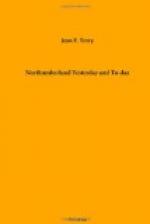As night fell, the fierce struggle continued until the darkness made it impossible to see friend or foe, but the fate of Scotland’s bravest was sealed. The king lay dead, covered with wounds, and around him a heap of slain; those who were able made their way in haste from the field, while the English host encamped where it stood. The more lawless in each army plundered both sides impartially, and when the king’s body was found next day, it too was stripped like many others around it.
“Then did their loss his foemen
know,
Their king, their lords, their mightiest
low,
They melted from the field as snow
Dissolves in silent dew.
Tweed’s echoes heard the ceaseless
plash
While many a broken band,
Disordered, through its currents dash
To gain the Scottish land;
To town and tower, to down and dale,
To tell red Flodden’s dismal tale,
And raise the universal wail.”
The tragic effects of that terrible day were long felt in Scotland. Every family of note in the land lost one or more of its members on the fatal field, besides the thousands of humbler beings who fell at the same time. Scotland did not recover from the crushing blow for more than a hundred years; and for many a day the people could not believe that their gallant king was really slain, but continued to hope that he had escaped in the darkness, and would one day return.
There has recently been erected on Flodden Field a simple cross of stone as a memorial of that tragic day. It was unveiled on September 27th, 1910, by Sir George Douglas, Bart. The inscription on the stone is “To the Brave of both Nations.”
THE FLOWERS OF THE FOREST.
A LAMENT FOR FLODDEN.
I’ve heard the liltin’ at
our ewe-milking,
Lasses a’ liltin’ before dawn
o’ day;
But now they are moaning on ilka green
loaning—
The Flowers of the Forest are a’
wede away.
At bughts,[12] in the mornin’, nae
blythe lads are scornin’,
Lasses are lonely and dowie and wae;
Nae daffin’, nae jabbin’,
but sighin’ and sabbin’,
Ilk ane lifts her leglin [13] and hies
her away.
In harst, at the shearing, nae youths
now are jeering,
Bandsters are lyart,[14] and runkled,
and gray;
At fair or at preaching, nae wooing, nae
fleeching [15]—
The Flowers of the Forest are a’
wede away.
At e’en, in the gloaming, nae younkers
are roaming
’Bout stacks, with the lasses at
“bogle” to play;
But ilk ane sits drearie, lamenting her
dearie—
The Flowers of the Forest are weded away.
Dool and wae for the order sent our lads
to the Border!
The English for ance by guile wan the
day;
The Flowers of the Forest, that fought
aye the foremost,
The prime of our land, are cauld in the
clay.
We’ll hear nae mair liltin’
at our ewe-milkin’;
Women and bairns are heartless and wae;
Sighing and moaning on ilka green loaning—
The Flowers of the Forest are a’
wede away.




